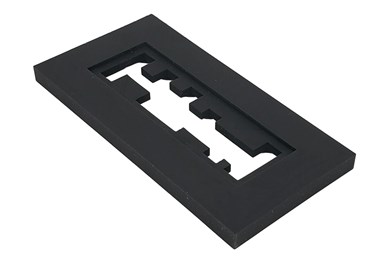Mechnano Develops First Nano-Uniform ESD, High-Temp 3D-Printable Resin
The resin for quick-turn soldering processes can help electronic manufacturing service providers reduce cycle time, increase throughput and ensure nano-uniform ESD protection.
In a recent case study, Mechnano partnered with Tethon3D to develop a high-temperature, rigid electro-static dissipative (ESD) material resin for quick-turn soldering processes. The resin can be processed on a variety of vat photopolymerization systems, including stereolithography, digital light processing and liquid crystal display.
The company says the vat photopolymerization process enables quick-turn part fabrication with ultrahigh accuracy, nano-uniform ESD and exceptional surface finish, while taking advantage of custom 3D-printable design freedom.
This can help the electronics industry be more agile when handling bespoke customer requests by using additive manufacturing (AM) to fabricate ESD parts to support the reflow process. Mechnano uses AM to help electronic manufacturing service (EMS) providers reduce cycle time, increase throughput and ensure nano-uniform ESD protection.
The new material offers more production agility which is essential for customer-specific applications that require a variety of nonstandard components for low-volume production runs. Customers often request custom carriers/pallets to hold printed wiring assemblies during the reflow process. These carriers must protect today’s micro-electronic components from electrostatic discharge and withstand multiple cycles of a high-temperature wave soldering process (245°C).
Using traditional manufacturing technologies for fabrication of these components can slow down production and increase costs, while using the traditional carbon fiber-filled materials in these components does not protect today’s electronics. The challenge is quickly fabricating custom nano-uniform ESD components that would withstand numerous thermal cycles. The newly developed material can address those issues.
Click here to view the full case study.
- Learn more about Mechnano’s ESD photopolymer resin which offers enhanced impact resistance and is well suited for parts that undergo a higher level of abuse where breakage would occur with more rigid solutions.
- Read about the B9Creations - Mechnano collaboration on carbon nanotube-enabled materials for production-ready additive manufacturing solutions.
Related Content
-
FDA-Approved Spine Implant Made with PEEK: The Cool Parts Show #63
Curiteva now manufactures these cervical spine implants using an unusual 3D printing method: fused strand deposition. Learn how the process works and why it’s a good pairing with PEEK in this episode of The Cool Parts Show.
-
Concept Sneaker Boasts One-Piece 3D Printed TPU Construction
The Reebok x Botter Concept Sneaker Engineered by HP premiered at Paris Fashion Week, hinting at manufacturing possibilities for the future of footwear.
-
3D Printed Spine Implants Made From PEEK Now in Production
Medical device manufacturer Curiteva is producing two families of spinal implants using a proprietary process for 3D printing porous polyether ether ketone (PEEK).















